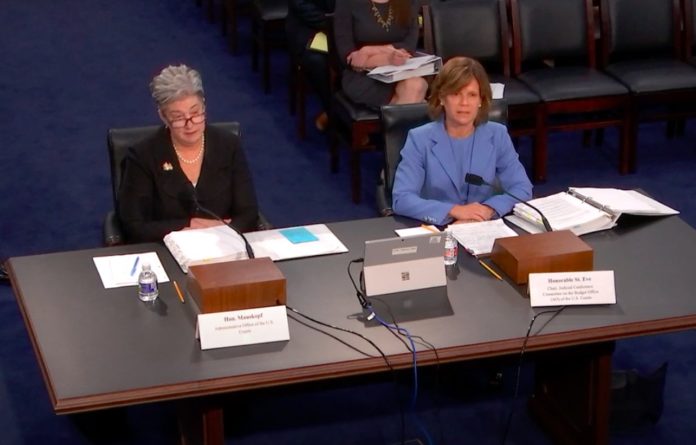
Federal judges asked the U.S. House of Representatives Committee on Appropriations for increased funding for the judicial branch to keep up with physical and cyber security concerns, growing workloads and pandemic procedures at a committee hearing on May 12.
Judge Roslynn Mauskopf, the director of the Administrative Office of the U.S. Courts, and Judge Amy St. Eve, the Chair of the Judicial Conference Committee on Budget, testified to the branch’s request for a 7.2% funding increase for federal courts in fiscal year 2023.
The request would bring next year’s appropriations to $8.6 billion, an increase of around $600 million from FY 2022, and would go toward federal employee pay raises, keeping up with increased workloads, updating courthouse infrastructures, improving IT and cybersecurity, additional staff and other expenses.
Congressman Steve Womack, the committee’s ranking member, expressed skepticism over the additional budget request. “That’s going to be difficult for this committee to provide,” he said, explaining that the federal government needed to keep costs down given current national debt.
Increasing courthouse security, the federal judges emphasized, is a large priority. Some funding would go toward courthouse repairs, increasing security infrastructure and other physical security measures. But both judges emphasized the importance of increasing cyber security.
Without going into the details of the department’s cyber risks, Mauskopf said she could not “overstate the gravity of the broad impacts across our society of cyber attacks on the judicial branch. These attacks pose risks to our entire justice system and more broadly, an attack on our democracy itself.”
St. Eve and Mauskopf said this year’s request would allow the branch to complete cybersecurity initiatives and relying on year-to-year funding, which fluctuates and can be unpredictable, could cause comprehensive cybersecurity projects to drag on.
The judicial branch requested funding for the branch’s current case management system which, Mauskopf testified, is the “backbone” of federal courts. The Case Management/Electronic Case Files (CM/ECF) system and its public access counterpart, the Public Access to Court Electronic Records (PACER) system, need to be replaced with consistent funding during their replacement period. “Based on extensive internal and external analyses of these systems, the AO has concluded that both CM/ECF and PACER are outdated, unsustainable, and require replacement,” Mauskopf said.
The judges requested increased funding to keep up with staffing needs, including annual raises to retain judges and staff, hiring court support staff and extending funding for a number of temporary judgeships while Congress considers legislation to add additional district judges.
Rep. Ann Kirkpatrick from Arizona asked St. Eve and Mauskopf about plans to address rising case loads for judges. Kirkpatrick mentioned that the federal district court in Arizona has struggled to meet high caseloads with some judges waiving typical court procedures to move cases along.
Mauskopf explained that this year’s budget request would go toward retaining several temporary federal judges, including one in Arizona, but that Congress will need to add more positions for permanent changes. The Judicial Conference of the U.S., the national policy-making body of federal courts, recommended four additional permanent judgeships be added to the district of Arizona in its bi-annual recommendations. The same recommendation asked for two additional positions in the district of Colorado to accommodate high caseloads.
Next year’s funding would also support rising workloads for public defenders and parole officers. FY2022 funding fell short of the judicial department’s request, St. Eve said, and the lack of funding impacted the branch’s staffing capabilities to hire additional public defenders and parole officers. Department staff are experiencing an uptick in work, she added, after COVID-19 slowed down case filings and postponed trials. After nearly two years, federal court staff are seeing a surge of work related to the pandemic. Part of this year’s increased funding would address the high caseloads of many judicial department staff, St. Eve said, adding that cutting the requested budget could once again “have the largest impact on our salary and expenses account.”
The judicial branch has also been impacted by U.S. Supreme Court decisions as well as legislation, and without increased funding, courts across the country have struggled to keep up with new requirements, the judges testified. Specifically, federal courts have seen increased work in response to the 2020 Supreme Court ruling in McGirt v. Oklahoma, which led to the transfer of major crimes involving members of five Native American tribes from Oklahoma state courts to federal courts for the Eastern and Northern Districts of Oklahoma.
Probation officers have also seen dramatically larger case loads after the 2018 passage of the First Step Act, which loosened criteria for parole supervised release for those convicted of federal crimes. The judges testified that an additional $30 million in funding would go toward hiring 564 full time probation officers.

